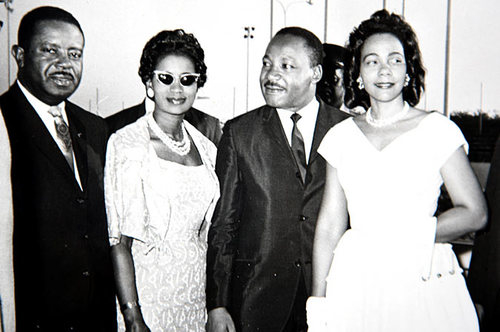
Good Morning POU
Today we pay tribute to a Civil Rights hero and legend, Juanita Abernathy.

Juanita Abernathy, the widow of civil rights icon the Rev. Ralph Abernathy and one of the last surviving architects of the modern civil rights movement, died Thursday. She was 87.
She died at Piedmont Hospital in Atlanta from complications related to a stroke, family spokesperson James Peterson tells NPR. Funeral arrangements are still being finalized.
“She was the last remaining major organizer” of the civil rights movement, according to a statement from Peterson.
Abernathy worked alongside her husband and Martin Luther King Jr. and many others in the 1950s and 1960s to push for equal rights for African Africans on a range of issues, from voting rights and school desegregation to housing protections.
She is credited with writing the business plan for the 1955 bus boycott in Montgomery, Ala., which protested the segregation of seating on public transportation in the city. The boycott — originally meant to last a day — went on for 381 days and eventually led to the courts declaring segregated seating unconstitutional.
Abernathy was born Juanita Odessa Jones in in Uniontown, Ala., and was the youngest of eight children. Her parents Ella and Alexander Jones were successful farmers, who raised dairy, beef and cotton. During the 1940s her family earned a designation of being the “most successful Black farmers in the ‘Black Belt,’ ” according to the family’s statement to the media.

Abernathy also taught voter education classes, providing housing for Freedom Riders and took part in the March on Washington in 1963.
In a statement, Rep. John Lewis, D-Ga., himself a civil rights icon, said he was “saddened” to learn of Abernathy’s passing, referring to her as “a cornerstone” of the Montgomery Bus Boycott and his “sister on the frontlines in the struggle for change. “Her life is a testament to the towering role that women played in the Civil Rights Movement,” Lewis said.
“The men received most of the credit, but behind the scenes women were often the doers, the organizers, and advocates, who formed the backbone of the struggle. Juanita Abernathy was no exception and was often a shining example,” Lewis said.
The National Park Service in a biography on Abernathy said she faced of death threats, in particular when the family was living in Montgomery.

“In January 1957 while her husband and King traveled to Atlanta to establish the Southern Christian Leadership Conference (SCLC), Juanita Abernathy and her infant daughter miraculously survived the bombing of their home by white supremacists,” according to the biography.
Abernathy told the Atlanta Journal-Constitution in 2013 that when she started her activism, receiving “recognition and honor” for her efforts was nowhere in her mind.
“I started when there were no cameras and no newspapers writing nice things about you, instead they were writing all sorts of ugly things,” Abernathy said in an interview that coincided with her being honored by the Atlanta City Council for her role in the civil rights movement.

“But we kept going. It wasn’t about us. It wasn’t about me. It has always been about right and righteousness. Justice and equality. Not just for me and my family, but for all of God’s children,” Abernathy said.
The Journal-Constitution also reported at the time that it was at the Abernathy’s kitchen table, “often following a meal prepared by Juanita,” that some of the early framework strategies for the civil rights movement were formed.
Charles Steele Jr., the president and CEO of the National Southern Christian Leadership Conference, told NPR in an interview that Juanita Abernathy was “fearless” and a “foot soldier” in the movement.
“The chemistry makeup of Mrs. Abernathy was that she was fighter,” said Steele, who has headed the civil rights organization co-founded by Ralph Abernathy and King for more than a decade.
Steele adds that being a first lady of the civil rights movement is just as important as the leadership.
“So I can imagine what she did in order to support not only Dr. Abernathy but also give the support to Dr. King and Mrs. Coretta Scott King. It was a team effort and she was a part of that,” Steele said.
In addition to her activism, Abernathy worked as a corporate skincare trainer for Mary Kay Cosmetics for 20 years, according to a family press release. She also served on a number of boards including for the Metropolitan Atlanta Rapid Transit System.
In 2015, she was honored for her civil rights contributions by the Congressional Black Caucus.
Abernathy is survived by her children Juandalynn R. Abernathy, Donzaleigh Abernathy, and Kwame L. Abernathy and four grandchildren.
